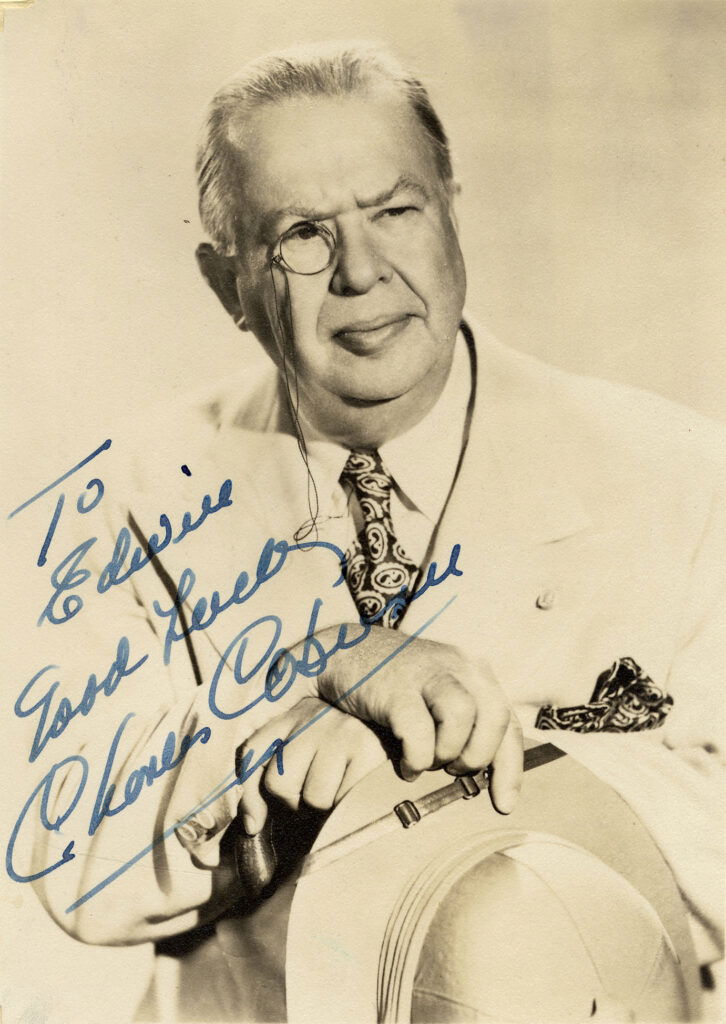Charles Coburn, a character actor and Georgia native, enjoyed a lengthy career on stage, screen, and radio that reached its height in the 1940s and 1950s, when he was in his sixties and seventies.

Courtesy of Hargrett Rare Book and Manuscript Library, University of Georgia Libraries.
Charles Douville Coburn was born in Macon on June 19, 1877, to Emma Louise Sprigman and Moses Douville Coburn. Coburn grew up in Savannah and as a young boy handed out programs in a local theater, where he received his first role, a bit part in the stage performance of William Gilbert and Arthur Sullivan’s opera The Mikado. Failing to win other parts for which he auditioned, Coburn worked briefly as a house manager until, at the age of nineteen, he left Georgia for New York City and the lure of Broadway.
His prospects in New York were grim, and he supported himself with a variety of odd jobs, including theater usher and package deliveryman. Shortly before he was to return to Savannah, he was hired as an advance man in a theater. This job yielded his first professional stage role, in a Chicago company’s traveling production of Quo Vadis.
Coburn continued acting in traveling companies and by 1904 was starring in the lead role of The Christian. In 1905 he founded his own theater company, the Coburn Shakespearean Players. That same year he met Ivah Wills when they were cast together in a production of William Shakespeare’s As You Like It. They married in 1906 and went on to produce several Broadway and off-Broadway plays.
Coburn was a passionate advocate for theater education and wrote letters to universities encouraging them to add professional actors as instructors. In 1934 the Coburns and Union College president Dixon Ryan Fox founded the Mohawk Drama Festival on the school’s campus in Schenectady, New York. The festival comprised an eight-week summer course in theater and the production of several plays.
After his wife’s death in 1937, Coburn moved to Hollywood, California, and began a film career. Although his earliest listed film credit is for Boss Tweed in 1933, the 1938 release Human Hearts is often cited as his first substantial film role. He appeared in supporting roles in numerous films, including Idiot’s Delight (1939), Made for Each Other (1939), The Devil and Miss Jones (1941), King’s Row (1942), In This Our Life (1942), Heaven Can Wait (1943), and The More the Merrier (1943), for which he won an Academy Award for his portrayal of Benjamin Dingle, a blustering but endearing businessman who typifies the characters Coburn often played. Although he was a classically trained stage actor, Coburn accepted many film roles that incorporated comedic and slapstick elements.
In the early 1940s Coburn appeared in as many as four or five pictures per year, but in 1945 he signed a contract with Columbia Pictures for just four movies in two years so that he could return to the stage and take on numerous radio and television parts. (The light film schedule also allowed him time to write an article on Savannah theater for a 1948 book titled Stories of Old Savannah.) In 1946 Coburn starred in the film Colonel Effingham’s Raid, an adaptation of the novel by Georgia writer Berry Fleming. His later screen work included roles in Gentleman Prefer Blondes (1953) and Around the World in 80 Days (1956). His final film was John Paul Jones (1959), in which he played Benjamin Franklin.
In 1959 Coburn married Winifred Natzka, who was forty-one years his junior and the former wife of Oscar Natzka, a New Zealand opera singer. Coburn died of a heart attack in New York City on August 30, 1961, at the age of eighty-four. He appeared in his last role, in a stage production of You Can’t Take It with You, in Indianapolis, Indiana, a week before his death. Coburn, who visited Georgia throughout his adult life, bequeathed his collection of theatrical papers and photographs to the University of Georgia’s Hargrett Rare Book and Manuscript Library. His ashes were scattered in Georgia, Massachusetts, and New York.




























